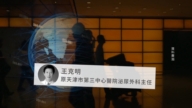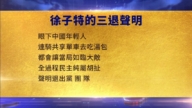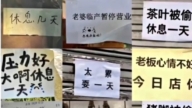【新唐人2012年6月23日訊】中菲黃岩島爭端還沒有結束,中越在南中國海又起衝突。 6月21號,《越南海洋法》把西沙群島和南沙群島包含在越南主權和管轄範圍內。中共外交部對此提出抗議,同時國務院批准設立地級三沙市管轄西沙、中沙、南沙群島的島礁及附近海域。專家指出,中共一貫「以領土換和平」的賣國外交政策,給了他國以可乘之機,另外「民主陣營」對「共產獨裁」的最後圍剿也是大勢所趨。
越南國會審議通過《越南海洋法》,宣佈對中越爭議的西沙群島和南沙群島擁有主權和管轄權。中共外交部聲稱,《越南海洋法》把中國西沙群島和南沙群島包含在越南主權和管轄範圍內,嚴重侵犯了中國的領土主權。
史學教授劉因全認為,中共在領土問題上一直採取「賣國政策」,使越南政府認為可以隨意佔用中國的土地。他說,在中共的歷史上,曾經大面積的把中國的領土劃給蘇聯、印度、尼泊爾、緬甸和越南。
劉因全:「這種讓步,叫越南看到了中國在領土問題上和民族利益上的這種軟弱,在這種情況下,像越南、菲律賓這種小國也敢欺負中國,這是長期的共產黨這種賣國政策和在領土問題上的這種退讓、賣國主義造成的。」
1979年鄧小平為了從華國鋒那裏奪取軍權,發動所謂的「對越自衛反擊戰」,據民間公布的數字,當時犧牲了十幾萬中國軍人,可是在鄧小平得到軍權後,又將十幾萬生命換取來的土地拱手送回給越南。
劉因全:「通過對越反擊戰,鄧小平把軍權拿到手,這個目地達到以後,相反,他在越南問題上又退讓,又把拿下來的領土還給了越南,相反現在越南得寸進尺,西沙群島它也要了。」
劉因全認為,當前中國國內矛盾突出,以及中共獨裁政權和西方民主政權之間不可調和的矛盾,也是造成周邊國家對中國蠢蠢慾動的原因之一。劉因全指出,中國應該在放棄共產獨裁的前提下,加強和美國等西方國家的合作。
國務院近期批准,撤銷海南省西沙群島、南沙群島、中沙群島辦事處,設立地級三沙市管轄西沙、中沙、南沙群島的島礁及附近海域。這是中國歷史上首次設立專門行政機構對這些島嶼進行管理。
時事評論員藍述認為,這種做法和中共前幾年提倡的「共同開發」的口號矛盾,不過這種強硬做法能夠起到轉移國內民怨的作用。
藍述:「國際社會上對中共批評的聲音,它依然採用以前這種買通的方式,剛剛結束的國際貨幣基金會議,中共提供的外援比金磚五國的其他四國和東道主墨西哥加起來還要多,周邊國家,它逐漸的採用一些強硬的政策,採用這些強硬政策,可以在一定程度上轉移中國民眾對中國深刻社會矛盾的注意力。」
而國際時事評論員文昭說,對於南中國海的島嶼而言,實際控制和主權是兩回事,目前各國都是在自己佔領的領域中招標開發,形成既定事實,希望時間久了以後,得到國際社會的認可。
西沙群島在上個世紀70年代,由越南佔領,在中越西沙海戰中,中國奪回了西沙,但西沙的主權雙方一直沒有達成共識,中沙唯一露出水面的黃岩島是菲律賓控制著,東沙群島則有台灣控制,南沙群島的情況比較複雜,印尼,馬來西亞,越南,菲律賓都在那裏插了一只腳。
目前美國的戰略重心已經轉移到太平洋,藍述認為,出於避免共產獨裁對世界造成威脅和傷害,中共的強硬政策會加速美國重心的轉移。
採訪編輯/劉惠 後製/葛雷
Why Vietnam Dare to Claim territorial control over West and South Paracel Islands?
The dispute over the Huangyan Islands between China and
the Philippines has not yet ended
Further conflicts arose between China and Vietnam over the
South China Sea.
On June 21st, Vietnamese Sea Law included West and South
Paracel Island within its territorial control.
The Chinese foreign ministry protested against it.
At the same time, Vietnam congress announced ownership
and its rights to manage West and South Paracel Islands.
The Chinese foreign ministry claims this action severely
infringes China’s territorial sovereignty.
History professor Liu Yinquan believes that the Chinese
Communist Party (CCP) have always managed territorial issues
with the “country selling policy”; letting the Vietnamese
government believe it can occupy China’s land at will.
Liu Yin Quan: “This concession has let Vietnam see China’s
weakness on territorial matters and peoples’ benefits.
Under this condition, even small countries like Vietnam and
the Philippines have the guts to bully China.
This is caused by the CCP’s “country selling policy”.
In 1879, Deng Xiaoping launched a Defensive Counterattack
against Vietnam in order to obtain power from Hua Guofeng.
According to information published, more than 10,000
Chinese soldiers were sacrificed in the struggle.
After Deng Xiaoping obtained military power,
he handed the land back to Vietnam.
Liu Yinquan: “Through counterattacking Vietnam, Deng
obtained power.
After this goal was achieved, he stepped back on the Vietnam
issue returning the territory back to Vietnam.
Now Vietnam becomes more insatiable and they even want
West Paracel Islands too.”
Liu Yinquan believes a reason for conflicts within China
include dictatorship and disharmony with western democracy.
These also cause neighboring countries to be ready to make
trouble for China.
Liu points out China should strengthen its cooperation with
the U.S. and other western countries under the condition of giving up its dictatorship.
China State Council recently approved the removal of
Government offices at West, South and Middle Paracel Islands in Hainan Province.
The CCP then set up jurisdiction under regional levels by
coastal areas.
This is the first time China has established a specialized
administrative body.
Current affairs commentator Lan Shu believes this method
conflicts with the previous slogan of “developing together”.
However, this tough practice can act to transfer
domestic grievances.
Lan Shu: “Despite international criticisms towards the CCP,
it continues to use this method of bribery.
The International Monetary Fund meeting just ended;
the foreign aid provided by the CCP is more than the total
put together of all the other five countries.
Neighboring countries will gradually use tough policies, which
moves Chinese citizens’ attention from China’s social conflicts.”
International current affairs commentator Wen Zhao says
as for Islands on the South China Sea, control and ownership are two separate things.
Currently each country is developing on its claimed territories
which has created a solid reality.
After a long time each country expects it will receive
International recognition of its claim.
Paracel Islands were occupied by Vietnam in the 1970s.
In the Paracel Islands Sea battle, China snatched West Paracel Islands back.
Both parties never reached an agreement concerning
West Paracel Island’s ownership.
Middle Paracel Islands are still controlled by the Philippines,
East Paracel Islands have Taiwanese control, and the situation
for South Paracel Islands are more complicated; Indonesia,
Malaysia, Vietnam and Philippine all have a foothold there.
Currently, the U.S.’s strategic focus has shifted to the Pacific.
Lan Shu believes this is from the intention to avoid threats
and harms the CCP dictatorship has caused.
It’s hard-liner policy will accelerate the speed for the U.S. to
shift its focus.




























